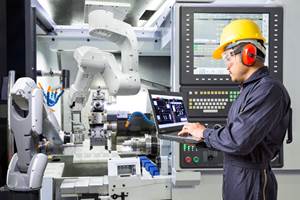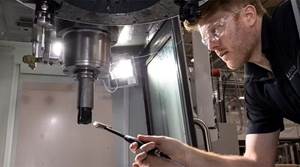Mold Shop Eases Into 3D Machining
Converting a shop from a 2D to a 3D machining environment is always a major undertaking, but the right equipment can make the transition easier.
Share





Converting a shop from a 2D to a 3D machining environment is always a major undertaking, but the right equipment can make the transition easier. That has been the experience of Chipsco Tools Inc., a Meadville, Pennsylvania mold shop that specializes in intricate, plastic injection molds for closures, electrical connectors, automotive parts and more. Over the last ten years, Chipsco has invested heavily in CNC mills, lathes and, most recently, CNC EDMs. "We wanted to have one of the strongest CNC EDM departments in the mold industry," explains Brian Learn, who owns the firm with his two brothers.
The new EDMs exposed a problem. Chipsco machined the graphite electrodes for its ram EDMs on two machining centers set aside for that purpose, but the process was slow. "The 3D geometry of the electrodes was so complex that we had to machine them at very low feed rates—six to seven inches per minute—to get acceptable dimensional accuracy and surface finish," Mr. Learn explained.
Chipsco started looking at high speed, dedicated electrode milling machines, but found them to be expensive—up to $400,000 for models with all the bells and whistles.
The search for a more affordable machine brought the shop to a seminar on high-speed milling of 3D shapes, co-sponsored by Creative Technology Corp., Arlington Heights, Illinois. While there, Chipsco learned all the reasons for the dismal feed rates that it was experiencing in milling graphite electrodes on its existing CNC machines. They also learned about the Creative Evolution CNC, a niche control developed specifically for high speed milling of 3D shapes, and how retrofitting one or more of their machines with the Creative Evolution control would enable them to machine 3D EDM electrodes three to ten times faster than possible with the original equipment controls. Because the Creative Evolution is a PC-based, open-architecture CNC, it offered Chipsco a number of other advantages that the shop's OEM controls could not. First, because the system is PC-based, it includes all of the performance improvements made in PCs in recent years, such as faster processing speeds, more memory and ability to be directly incorporated in a local area network (LAN) such as Ethernet.
Chipsco came away from the seminar impressed with the advantages the control offered and started thinking in terms of retrofitting it to one of the machines in its shop. The firm contacted Barney Machinery Co., Pittsburgh, Pennsylvania, a machine tool distributor who represents Creative Technology in the Pittsburgh and Erie areas.
Barney Machinery asked for and received permission to offer the Creative Evolution control as an alternative to the factory installed CNC on a leading manufacturer's vertical machining centers sold to customers who intended to use their machines primarily for 3D machining of graphite electrodes and die/mold steels. The result was Barney's Evolution Series CNC machining centers.
Chipsco decided to buy a new Evolution Series built on a smaller machining center, rather than retrofit one of its existing machines. It equipped the machine with a dust collector and is using it almost exclusively for milling of 3D graphite electrodes for its ram EDMs.
"The impact of the Evolution Series machine on our electrode machining operations has been fantastic," says Mr. Learn. "With the Evolution Series machine we're machining electrodes four to ten times faster than before."
"Now because we're machining much faster, we can program for a much tighter 0.000050-inch scallop height," Mr. Learn explained. "We get a better, more accurate electrode that requires little or no handwork, and get it much faster. Often, we don't have to do any polishing of the electrode or the steel before making our first samples. We go right from EDMing to fitting and assembly."
In the several months since Chipsco installed the Evolution Series machining center, all 3D electrode machining has been transferred to it. As a result, machining time for the electrodes has become more predictable. "Before, we were always underestimating the amount of time required to machine the electrodes," Mr. Learn said. "Now, the machining has become more consistent and we're beginning to get the jobs done closer to estimated times.
"We measure our capacity in hours, and we're getting three to five times more work out of every hour than before," Mr. Learn enthused. "We have not only eliminated our 1400-hour electrode backlog but we have also reached the point where we are making electrodes ahead of time.
"Before, electrodes were made on an as-needed basis," Mr. Learn explained. "Today, we get our electrodes and steel within days of each other. If we're on a 12-week window, we can, if we choose, make the electrodes six weeks before we need them.
"One of our goals has been to climb ahead of production so that we're always 12 jobs ahead," he added. "We're four to six jobs ahead right now.
"With the new technology, we've been able to reduce our lead times from the customary 12 to 14 weeks to six to eight weeks," Mr. Learn pointed out. "Our goal is to be able to deliver complete tools in three weeks." The shop's nine CNC mills are rarely idle as it is, but the firm expects to improve milling efficiency by retrofitting at least one of them with a Creative Evolution control.
"We didn't have to sacrifice accuracy to get the higher machine speeds," Mr. Learn added. "It's just the opposite, accuracy increased." Chipsco is fulfilling its strategy for continued improvement and reduction of its turnaround times. MMS
Related Content
The Future of High Feed Milling in Modern Manufacturing
Achieve higher metal removal rates and enhanced predictability with ISCAR’s advanced high-feed milling tools — optimized for today’s competitive global market.
Read More6 Machine Shop Essentials to Stay Competitive
If you want to streamline production and be competitive in the industry, you will need far more than a standard three-axis CNC mill or two-axis CNC lathe and a few measuring tools.
Read MoreHow to Mitigate Chatter to Boost Machining Rates
There are usually better solutions to chatter than just reducing the feed rate. Through vibration analysis, the chatter problem can be solved, enabling much higher metal removal rates, better quality and longer tool life.
Read MoreOrthopedic Event Discusses Manufacturing Strategies
At the seminar, representatives from multiple companies discussed strategies for making orthopedic devices accurately and efficiently.
Read MoreRead Next
5 Rules of Thumb for Buying CNC Machine Tools
Use these tips to carefully plan your machine tool purchases and to avoid regretting your decision later.
Read MoreSetting Up the Building Blocks for a Digital Factory
Woodward Inc. spent over a year developing an API to connect machines to its digital factory. Caron Engineering’s MiConnect has cut most of this process while also granting the shop greater access to machine information.
Read MoreRegistration Now Open for the Precision Machining Technology Show (PMTS) 2025
The precision machining industry’s premier event returns to Cleveland, OH, April 1-3.
Read More

































